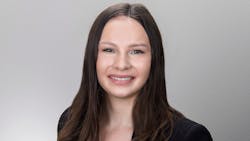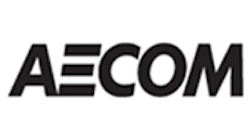- One word to describe yourself: Compassionate
- Alma Mater: Northern Arizona University
- Fun fact about yourself: I am a second-degree black belt.
- Favorite station or stop that you have ever visited or frequent (and why): Burrard Skytrain Station in Vancouver because I LOVE the pedestrian plaza at the station. The plaza has a lot of vegetation that makes the station a nice place to spend time.
- Favorite transit route: The route I use most frequently is RTD’s Route 10. It picks me up right next to my apartment and drops me off directly in front of my office.
Dayna Wasley is a passionate, driven professional who goes above and beyond to help communities become more equitable and accessible. Wasley grew up with two older sisters who were unable to drive due to developmental disabilities and witnessed their struggles to find transportation to go to their jobs, doctors’ appointments, the grocery store and other essential locations. Seeing the challenges her sisters faced on a day-to-day basis, Wasley knew that she wanted to create better transportation systems that were accessible by everyone, regardless of their background or ability.
In college, Wasley discovered urban planning and knew that was the path to creating more accessible communities. Through her hard work in school, Wasley was selected for a prestigious fellowship for transportation planners known as the Montoya Fellowship. The Montoya Fellowship is granted annually to an exceptional student at Northern Arizona University who demonstrates interest in transportation planning. The fellowship gave Wasley the opportunity to be a shared employee between the Flagstaff Metropolitan Planning Organization and the Northern Arizona Intergovernmental Public Transportation Authority. Working for both agencies gave Wasley a holistic view of every facet of transportation and helped her develop a passion for public engagement.
Wasley demonstrated strong promise early on in her career. Her senior capstone project was selected as the best student planning project in the state by the American Planning Association (APA) Arizona Chapter. Her passion for transportation also led her to applying for the Sharon D. Banks scholarship which is offered through the Women in Transportation Seminar (WTS). Wasley not only won the local Phoenix chapter award but went on to win at WTS International, as well. Since receiving these honors at the beginning of her career, Wasley has made significant contributions to the public transportation agency and continues to be a high achiever.
After graduation, she accepted a position as a transportation planner with AECOM. As a consultant, Wasley has helped clients around the nation complete a variety of planning studies that pertained to bus rapid transit, Transportation Demand Management (TDM), pedestrian safety, emerging technologies and mobility hubs. On top of her integral roles on planning studies, Wasley has developed a reputation as a “Grants Guru.” As a skilled writer and storyteller, Wasley has helped her clients secure more than $29 million in federal funding within the past three years, including a BUILD grant for $17.4 million. Wasley is a strong leader and collaborator and has developed a team of technical experts, planners and graphic designers that she works with to prepare competitive applications.
Wasley has played an integral part in helping the transportation industry move forward through her work with emerging technologies. Serving as a member of Arizona Forward’s Mobility Committee, she helped the non-profit conduct a series of town halls across the state to learn about stakeholders’ views on automated and connected vehicles. Based on the feedback from participants, Wasley co-authored a white paper on automated and connected vehicles which has been used to further the conversation on automated and connected vehicles in Arizona with state legislators and other key stakeholders.
Throughout her career, Wasley has also made substantial contributions to understanding characteristics that influence the implementation of emerging technologies. She played an important role in a project known as the Mobility Evolution Initiative (MEI). MEI was a collaborative effort between the Colorado Smart Cities Alliance, the Denver South Transportation Management Association and AECOM. The project aimed to determine where it would be most feasible to implement smart first mile/last mile solutions, such as micromobility and automated shuttles. Wasley led a robust Geographic Information Systems analysis that involved relating a wide variety of data layers to prioritize the locations implementation of the emerging technologies.
Wasley also spearheaded the development of an Equity Analysis Tool that is now used across the West Region Transit-Rail group. The tool is intended to ensure AECOM is delivering equitable projects that reflect the needs of the community. Equity is a critical aspect of transit planning, and this innovative tool helps project teams around the nation understand the holistic impacts of transit projects.
Wasley is committed to taking on an active role in the transportation community and has been actively involved in several professional organizations, including Arizona Forward and WTS. She has been a featured speaker at local, national and international conferences, including Transportation Review Board (TRB) and WTS. In addition to taking on speaking roles, Wasley has published an article with Mass Transit magazine on the financing and implementing BRT systems. Her passion for sharing her knowledge has helped further the industry conversations surrounding emerging technologies and planning practices.
Recently, Wasley has taken on a new role within AECOM and is part of the new West Region’s Transit-Rail Technology Group that focuses on bringing innovative, technology-driven solutions to clients. As one of the group’s founding members, Wasley has helped build the new group and serves as the main technology liaison for seven states within the region. Since being in this new role, Wasley’s hard work and commitment has helped AECOM win technology-related contracts.
Since the Montoya Fellowship made such an impact in her career, Wasley wanted to help college students and new graduates get involved in the field. For this reason, she created a Transportation Planning Intern position in AECOM’s Denver office. As the supervisor for the position, Wasley ensures that the intern gets meaningful experience in the field through working on real public transportation projects around the nation. Wasley goes above and beyond to be a mentor to the intern and help them develop their career.
Is there a specific experience that led you to where you are today?
Growing up, I lived in an area that had limited access to transit. I have two sisters who have developmental disabilities that cannot drive, and I saw the struggles that they went through on a day-to-day basis to access medical care, educational opportunities and employment opportunities. I knew that there had to be another way for people to get around when they are unable to drive. I knew that I wanted to do something that would create more equitable opportunities for people with disabilities, and I was drawn to transit planning because it truly does create an equitable, affordable transportation option.
What do you enjoy most about your job?
I love that I make a difference in people’s everyday lives. Transportation is something that everyone deals with every single day, and if I can help create a higher quality public transportation system that helps people access opportunities that they may not have had otherwise is super rewarding.
What’s the most challenging part of your job?
Balancing different interests. Major transportation projects often have a lot of different stakeholders with different interests, and it can be challenging to find solutions that meets all the wants and needs of the community.
Accomplishment you’re most proud of and why?
I’m really proud of all the funding I’ve secured for clients to implement project that will make it safer and more comfortable for people to access transit. Safety is a big problem throughout the country, and winning funding that helps communities address these critical concerns means so much to me.
Best advice/tip/best practice to share from your area of expertise?
Be open to innovation. The transportation industry is rapidly evolving, and I think it’s important that we plan infrastructure with the future in mind. I think right now is such an exciting time to be a transit planner, and I feel so fortunate to be working on projects that will help drive the next generation transportation. Working on projects like mobility hubs and mobility-as-a-service feasibility studies have shown me how being open to innovation can really open the door to so many social and environmental benefits that we can all benefit from. Innovation can remove some of the barriers to taking transit by making it easier than ever to get to where you want to on public transportation.




